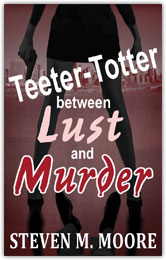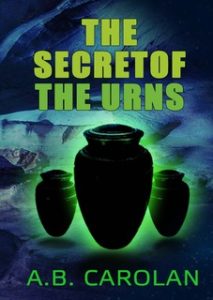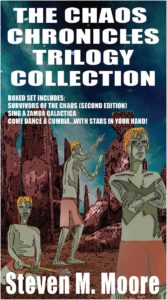Sci-fi reading and writing, part three…
[Note: This article is the third part of a three-part series on the topic of reading and writing sci-fi. In the first part, I discussed my sci-fi blues. In part two, I discussed some non-fiction sci-fi reading—is that possible? You can find out why I think the answer is yes in that article. In this part, I’ll talk about my solution to my sci-fi blues—writing a new sci-fi novel that’s also a rom-com.]
I’m not a good sci-fi writer if “good” is measured by sales numbers of my books. That’s certainly the definition the Big Five and its lackey, the NY Times Book Review, use. I have two consolations at least: First, I don’t give a rat’s ass about being a best-selling author according to the Big Five and the NY Times; and second, I consider each of my books to be a success if it entertains at least one reader. I’ll accept the fame and glory if I become a best-selling author—who wouldn’t? Even more modest success, as determined by commercial considerations, is welcome too. Moreover, I often write stories, especially now when I’m in a more experimental stage of my writing career, because I want to stretch my wings a bit and fly to other realms.

I started publishing in the sci-fi genre. I suppose my first book Full Medical (2006, now with an ebook second edition) might be considered more a thriller than sci-fi, but it and the series it’s part of, is sci-fi. To put that in context, Teeter-Totter between Lust and Murder (2013) was the first book that was more mystery than thriller, although the first two books in the Chen and Castilblanco series certainly have mystery elements. Teeter-Totter was an experiment. Young adult literature was an experiment too, but the “ABC Sci-Fi Mysteries” (from my alter-ego, A.B. Carolan) is sci-fi mystery.
Obviously some experimenting with genres is going on, perhaps more along the lines of crossovers. I’ve never written fantasy, but Rogue Planet has fantasy-like Game-of-Thrones elements (no dragons!). I’ve never written romance or comedy, although almost every novel has some romance simply because fiction has to seem real, according to Tom Clancy (he probably violated his won maxim, though) and romance is definitely part of real life. So my next experiment is a combination of three genres—romance, comedy, and sci-fi! Let’s call it a sci-fi rom-com.

In the second article in this series, I mentioned Brian Greene’s new book. He has a lot of words about quantum mechanics. It’s strange that he only mentions the “Many Worlds Theory of Quantum Mechanics” in the notes at the end. Ever since I learned about Hugh Everett III’s interpretation (in the QM courses I taught, I spent considerable time on interpretation, primarily because I did some research on that and taught the students the Feynman path integral), it has fascinated me. Einstein struggled with those interpretations, but I thought Everett’s was the closest to providing the best, far better than the Copenhagen one that many professors still teach (the wave packet mysteriously collapses because it interacts with the observers conscious mind—I don’t think so, because quantum phenomena even takes place at the center of stars). Everett’s interpretation couched in terms of quantum histories (Feynman’s famous path integral is a complex sum over a particle’s possible trajectories) was used by Hartle and Hawking to discuss quantization of gravity, which would reconcile Einstein’s general relativity with quantum mechanics (still an unsolved problem for the most part, by the way, if you’re looking for something to do).
I applied Everett’s interpretation to the many universes in the multiverse (see Greene’s earlier books) to get a stardrive, AKA apparent FTL travel, in Sing a Zamba Galactica (novel #2 in The Chaos Chronicles Trilogy Collection). Of course, in those novels, jumping from universe to universe in the multiverse is just a plot device to replace Asimov’s “jumps” and Star Trek’s warp speeds, of course (what the hell are dilithium crystals?), but it sounds more scientific (and might make Greene smile?).
In my short story “The Apprentice,” physicist Gail Huff, working at MIT (that’s Middleton Institute of Technology), uses Everett’s theory and the universes in the multiverse to explain time translation and create a time machine that can only move things forward in time. (The story can be found in one of the Pasodobles collections—I don’t remember which one, but the first is available on Amazon while #2 and #3 are free downloads; you can see the entire list on the “Free Stuff & Contests” web page at this website.) Short stories often grow into novels. My latest one, A Time-Traveler’s Guide through the Multiverse, is a continuation of that short story “The Apprentice.” Sci-fi, to be sure, but also a rom-com. I’ve stretched my writing wings a bit into the realm of romance and comedy. Hopefully, I won’t suffer Icarus’s fate and fly too near the sun!
Is this good sci-fi? It’s definitely an extrapolation of current science, but have I gone too far? And should romantic comedy even be combined with sci-fi? It’s a writing experiment, something I felt compelled to write because I couldn’t find good sci-fi to read! The writing is always more fun than the reading. Readers will have to determine whether it’s good sci-fi, whether the Big Five’s commercial definition of good is used, or good in the sense of all those old sci-fi classics.
***

Comments are always welcome.
The Chaos Chronicles Trilogy Collection. This trilogy contains a superstring drive to provide the appearance of FTL travel, allowing one to jump between universes of the metaverse. And Humans first encounter with ETs is with intelligent beings they call Rangers who communicate by telling elaborate stories via spread spectrum signals. But this trilogy is really a bow to Isaac Asimov—it even has my version of the Mule in the third novel (no, it’s not Swarm). Available in .mobi (Kindle) ebook format at Amazon, and in all ebook formats at Smashwords and its affiliated retailers (iBooks, B&N, Kobo, etc.) and lending and library services (Scribd, Overdrive, Baker & Taylor, Gardners, etc.). Enjoy!
Around the world and to the stars! In libris libertas!
